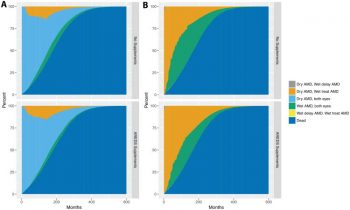Age-related macular degeneration is a leading cause of blindness and visual impairment, and the incidence is expected to increase as the US and UK population ages. Although there are drugs available to slow the progression of this disease, they are expensive and must be administered by intravitreal injection. Studies have found that high-dose antioxidant vitamins and certain minerals may be beneficial for the prevention, however. Although these supplements are frequently prescribed in the US, they are not not routinely funded or prescribed throughout the UK. In this study, the authors developed an economic model using UK cost and prevalence data to investigate the cost-effectiveness of prescribing these vitamin supplements for cases of age-related macular degeneration.
The authors considered two types of patients: those with bilateral intermediate age-related macular degeneration, and those with unilateral neovascular age-related macular degeneration. These patients are classified has having AREDS (Age-Related Eye Disease Study) category 3 and AREDS category 4 disease, respectively. Patients who received the supplements were compared to controls who did not. The main outcome measures were quality-adjusted life years (QALYs) and healthcare costs.

The authors found that for patients with AREDS category 4 disease, intervention with AREDS supplements was cost-effective. Over their lifetime, these patients received 7.67 fewer intravitreal injections on average (lower cost) and gained 0.16 quality of life years compared to those who did not use the supplements. In patients with bilateral intermediate age-related macular degeneration (AREDS category 3), however, the cost benefit was just above the threshold of 20,000-30,000 pounds per quality of life year that the National Health Service uses to determine whether or not to cover a treatment.
The authors estimate that cost of providing AREDS supplements for category 4 patients in the UK would be 6.99 million pounds in the first year, which would be offset over the lifetime of the patients through fewer intravitreal injections. Such an approach could could save 131 million pounds of ranibizumab injections over a lifetime for this first year cohort of patients, based on the costs and treatment strategies used to perform the analysis.
In conclusion, the model demonstrated that the use AREDS supplements is a cost-effective intervention for REDS category 4 patients with unilateral age-related macular degeneration in the UK.
Lee AY, Butt T, Chew E, Agron E, Clemons TE, Egan CA, Lee CS, Tufail A. Cost-effectiveness of age-related macular degeneration study supplements in the UK: combined trial and real-world outcomes data. Br J Ophthalmol. 2018 Apr;102(4):465-472. doi: 10.1136/bjophthalmol-2017-310939. Epub 2017 Aug 23. PubMed PMID: 28835423; PubMed Central PMCID: PMC5825252.

